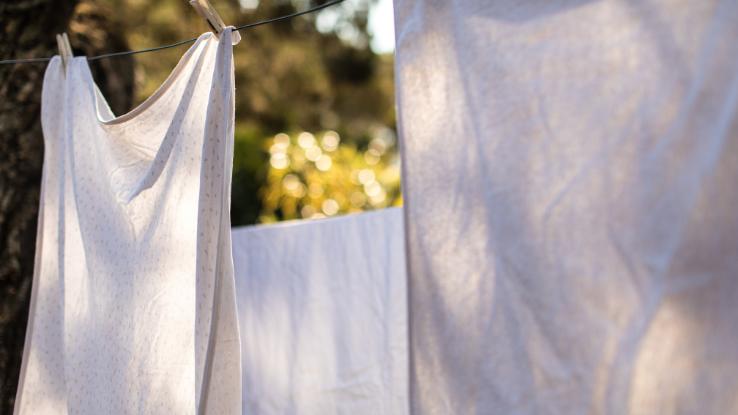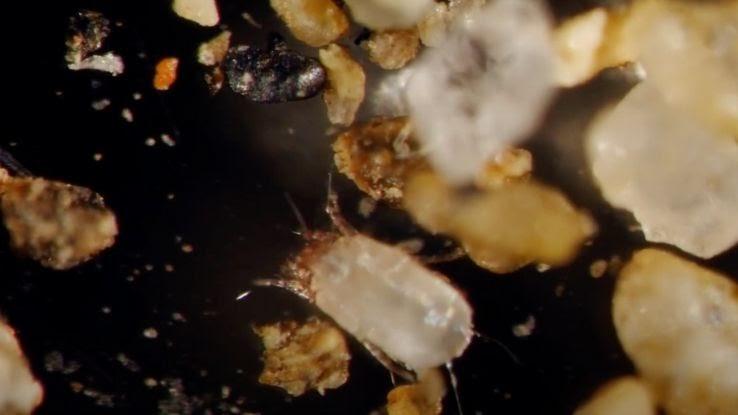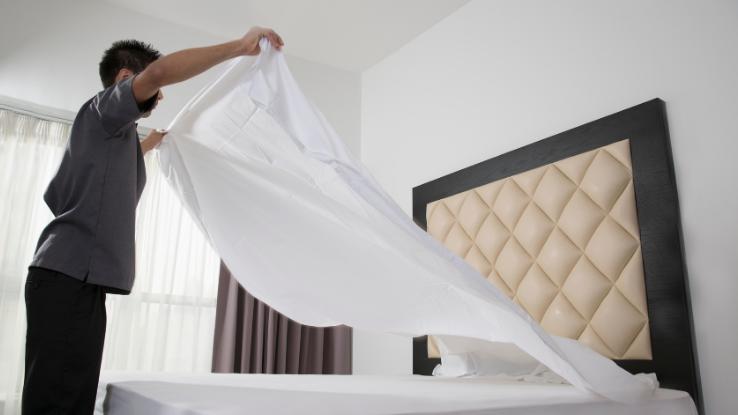Bedroom Wall Ideas Behind Bed

Are you washing your bed sheets as often as experts recommend? Probably not. According to recent findings, the average person changes their sheets every 24 days or so — or, roughly, every three weeks. Maybe that seems acceptable to you, and, clearly, you wouldn't be alone. But that doesn't change the fact that unwashed bed sheets are a paradise for microscopic dust mites and other allergens. So, how frequently should you wash your bedding? We're taking a look at some tips and tricks — and delving into why stretching a set of sheets for that 24-day duration isn't a very healthy idea.
Here's the thing: If you're only washing your bed sheets once a month, you're not doing it enough. Ideally, you should be washing them every week. (Or, at a minimum, every other week.) If you're sick or taking care of someone who's not feeling well, washing the bed sheets daily is an important step when it comes to getting better. Don't forget to wash the sheets in warm water and dry on a high setting to kill any potential bacteria.

And don't forget about your pillow. Yes, the actual pillow, not just the case. You may not want to think about it, but pillows can host mold, yeast, and bacteria, which, in turn, can cause conditions like asthma. Haven't washed your pillow in years? Maybe this is the time to invest in a new one.
What Lives in Your Sheets?
By now, you've probably checked your sheets to see if anything's there. If you don't see anything, you shouldn't feel relief. The thing is, you won't be able to find anything without the help of a microscope, which can magnify all those small, white spider-like creatures that call your bedding home. Known as dust mites, these pests are invisible to the naked eye, but they're around. The best way to keep them under control? Wash your sheets regularly in hot water. If you don't, you might develop allergies or inadvertently weaken your immune system.

Of course, dust mites aren't the only things residing in your sheets. Dead skin cells are an unavoidable contaminant since our bodies shed a million skin cells every single day. To make things worse, these cells actually attract dust mites. Additionally, most sheets are dirtied by natural oils that your body produces and, of course, sweat. For those of us who enjoy a midnight snack, there might even be some crumbs dotting the bed sheets.
A Guide to Washing Your Bed Sheets
Already planning your next washing? Luckily, there are plenty of ways you can clean each piece of bedding to keep things fresh, clean and dust mite-free. Remember: It's always important to follow the manufacturer-provided instructions, but these tips might help take things to the next level.

Bedsheets:
- If hand-washing, your bed sheets should be washed in hot, soapy water.
- Make sure you don't wash them with clothes as this may cause damage or lead to pilling.
- If you spot a stain, try to take care of it before the washing process begins.
- Need to brighten up white sheets? Add a quarter of a cup of lemon juice before washing with warm water.
- When using a dryer, try a medium or low setting since high heat might damage the fibers.
- Fun fact: The best way to prevent your sheets from stretching out is to ball them up when you put them in the washer.
Blankets:
- Depending on your blanket fabric, you may need to pay attention to the instructions provided by the manufacturer. Generally, your wool blankets should only be washed in cold water and put on a low spin setting once in the dryer.
- Never wash your electric blankets or weighted blankets in a machine — for obvious reasons.
- Don't have time for a proper wash? Try vacuuming your blankets.
- To avoid further damage, mend any rips and tears before washing your blanket.
Comforters & Bedspreads:
- Comforter washing is a bit complicated. You should always test the comforter for colorfastness first by dipping a corner into a bit of the detergent. If the color bleeds, have it dry-cleaned instead.
- Your comforters or bedspreads may require special care that your regular washing machine isn't able to provide as well. Consider cleaning them in a commercial washer and dryer instead.
- If you've decided to wash your comforter at home, you should do so in cold water and on low heat. If possible, let the washed bedspread air dry on a clothesline.
Quilts:
- Quilts are just as delicate as comforters and should be washed in the same way.
- It's always best to hand wash quilts that are old and fragile.
- Never wash silk or velvet quilts.
Pillowcases:
- Pillowcases should be machine-washed in cold water and dried on a cool setting.
- Remember to fluff your pillows daily to get rid of dust and dead skin cells.
- You should air out your pillows frequently by hanging them on a clothesline — or, if you don't have a clothesline, leave them near an open window.
Resource Links:
- "You may not believe how long people wait to change their sheets" via MediaFeed.org
- "How Often Should You Really Wash Your Sheets? Our Cleaning Expert Weighs In" via Good Housekeeping
MORE FROM SYMPTOMFIND.COM
Source: https://www.symptomfind.com/health/washing-bed-sheets-guide?utm_content=params%3Ao%3D740013%26ad%3DdirN%26qo%3DserpIndex







Tidak ada komentar:
Posting Komentar